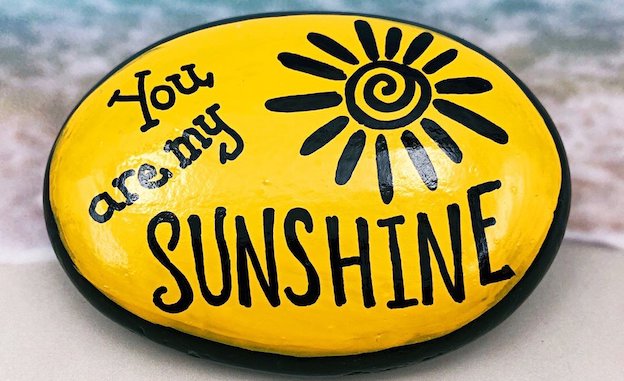You are My Sunshine
In the nineteen sixties, the existence of a co-ed military high school, where air force uniforms were worn and military representatives came regularly to the school to advise and the lecture was uncommon. Such a school, however, existed on the island of Oahu, and it was called Maryknoll Military Academy.
During my senior year at the school, every day was begun, first by attending a Catholic mass in the school chapel before seven a.m. and then going to the first class of the day, which was called homeroom. Homeroom was all about getting organized for the rest of the school day, announcements, scheduling, and also the teaching of civics and lectures on family behavior. Sister Anna Doloritas was my homeroom teacher, and she was a Maryknoll nun of such strictness and discipline that it would not be until I eventually went to Marine Corps Basic Training that I would encounter such harsh, brutal and pain-inducing communications, along with a bit of physical encouragement.
My final year at Maryknoll, before graduating, was one of constant difficulty in getting along with Sister Anna Doloritas, and the rest of the school’s rigid military code and the applications fo that code. In that year of troubles I was expelled three times but then brought back by the school’s principal, another nun, who’d been my fifth grade teacher years before. She openly stated that she saw great intellect and talent residing somewhere deep inside me that nobody else could see or understand.
Every day of that school year, the homeroom period would begin when the long morning bell stopped ringing. By that time all students, including me, were required to be in their seats and sitting at a position of attention. Sister Doloritas would stand, in all her bizarre but wonderful black and white glory, lean down over her desk, and place a record on the Victrola which took up half the desk’s top. The record was always the same. The song was called “You are my sunshine,” and Sister Doloritas forced the class to listen to the entire song, finally encouraging every student to sing along at the end.
After I was expelled for the third time, and then brought back by the miraculous blessing of Sister Michael Marie, my mental state had been reduced to something akin to terminal depression. I could function as a student, do the necessary drill out on the asphalt grinder and participate in the required studies and sports of the time, but I could no longer do it in the same expressive and enthusiastic way I’d done previously that had caused me to rise to be the school’s award-winning extemporaneous speaking champion, president of the chess club and holder of the school three-mile run record.
On the day of my return to homeroom, I sat at attention with the others, my facial expression without emotion, singing the last words of what I considered the world’s most awful song like a robot.
Sister Doloritas was no stranger to being a teacher, a leader, and the many other things she had done in her life up to encountering my class and being appointed our homeroom teacher. When the bell rang and the class was over that morning, I got my books and headed for my next class, but I didn’t make it. Sister Anna stood at the door, the only open one we all had to pass through to get out to the busy hall. She let everyone pass except me. When I began to exit through the door, she brought up her pointer and stuck its tip painfully into my side.
“You, little Strauss, you wait,” she said, in her coldest most imperious tone.
I stopped dead, turned, and then went to the front of her desk, the place most students, and I several times in the past, went to receive either physical punishment or mental humiliation for some transgression of one of the many rules we were all subject to.
Sister Anna closed the door and approached the desk. My depression, during that short period of time, was overcome by my fear. I didn’t shiver on the outside, but I was quaking on the inside.
“You don’t care for the song,” Sister Ana said, approaching close to me until her nose was no further from my own than a balled fist might occupy.
“No, sister, “ was all I could breathe out, having learned that Sister Anna was also a living human lie detector.
“Do you understand the song?” she asked, her tone changing from hard and cold to soft and ever so menacing in its softness.
“No, sister,” I replied, too afraid to lie and get caught.
“You don’t understand the meaning of the song?” she went on.
“No, sister,” I answered.
“I’m going to play it again,” she said, “and I don’t want you to sing along, I just want you to listen to every word. You can do that because you have that strangely disconnected memory.”
I didn’t understand what Sister Anna was talking about. I could remember almost everything, that was true, but I never looked at the talent as anything but a burden, simply because everyone wanted to test it, poke it, or use it to store information for their own current or future use. I said nothing, since she hadn’t asked me a question.
The song played all the way through, once more. The needle on the record kept clicking loudly when the song was over, as the player had no-repeat or continuous play capability. Sister Doloritas didn’t turn the record player off, however. She simply stared into my eyes in the most terrifying way, my own eyes unable to blink, staring back into the dark pits of her own, while the record clicked on.
“I’m going to tell you the meaning of this song, a meaning which you have missed since you first came to my class, and you first met me,” she said, the record player seeming to click one for each word that slowly came from her mouth.
Once again, since she hadn’t asked me a question, I remained wisely silent.
Sister Anna looked away, finally, her gaze going to the row of windows that ran up and down one side of the room, the side where my desk was closest too and I’d been punished many times for gazing out of when I was supposed to be focusing my attention on something else. The view wasn’t anything special, as the H-1 highways ran just outside and forty or fifty feet down the hill, with Waikiki, seen from the backside, but not all the way to the ocean.
Without looking back into my eyes, and allowing me some relief from her magnetic and seemingly all-knowing stare, Sister Ana began to talk.
“The lyrics are about you,” she said softly. “The song is all about you and the special nature of what and who you are. You were sent to me as a gift and if it appears from my teaching that I don’t see that then you are wrong. Every time that song plays, I think of you, while avoiding looking at you so that you won’t know how special you are.”
She said no more, her concentration remaining on the traffic and Waikiki activity presenting itself outside the windows. One window was wide open. A gust of the trade winds blew through it and over both Sister Anna and I. The aroma was of plumeria, the most common flower on the school grounds, and the ones male cadets of the school military corps bought to give to girls being dated and invited to the many school balls.
After a few minutes, during which Sister Anna neither moved nor spoke, I slowly made my way to the classroom door, opened it, and then quietly escaped into the hallway before racing away to get to my next class.
I couldn’t get Sister Anna’s words out of my mind, nor the lyrics to the song. I went home and stayed up after the rest of my family went to bed. I sat in the front window and stared out into the moonlit night, the great orb seeming to float just above the peak of a very distant Diamond Head.
The next day I sat once more in the homeroom class. Sister Anna did not look at me. She played the song, but somehow the song had been changed. Every word of the lyrics seemed to penetrate deeply into my very being. I sang with the rest, but this time, and for the first time, I enjoyed and meant every word that I sang.
I never had any trouble with or gave any more trouble to, Sister Doloritas in the time it took for me to finish my senior year, and I never had another conversation with her. I wanted to, but could think of nothing to say, or even ask.
Twenty years later, I returned to Oahu and, on a lark, went back to the high school I’d attended so long before. I noted that it was a high school and no longer a military academy. I inquired about the teachers who’d taught there during my time of attendance. I was told that some of them had retired to a convent on the windward side of the island, but they had no list. I got the address of the convent but didn’t think much of visiting the place until my wife mentioned, when we were on the north side of the island, that it might be fun to stop by.
Surprisingly, when we got to the convent, the attendant at the front desk put a list in front of us with the names of all the nuns living there. Sister Anna’s name was listed halfway down the sheet of paper. I asked if I could see her. The attendant placed a call to her phone. Minutes later Sister Anna came down the set of stairs at the end of the hall. She walked slowly and hesitantly to where we were. I only then realized how old she had to have been when she was my homeroom teacher but, back then, all nuns had looked alike to me.
“Thank you for coming to visit, Little Strauss,” Sister Anna said, with a big smile, and her hand held out to my wife. “I ‘m presuming you are Mrs. Strauss,” she said warmly.
We talked, sitting on a bench in that stark dim hall, for many minutes. Finally, Sister Anna asked a question.
“Why have you come to visit me? she asked, directing the question to me, the look in her eyes the same as it had been that day when I’d stood before her desk so long ago.
“The song,” I began, but she wouldn’t let me go on.
“You are my sunshine,” she whispered and then laughed. “I still love that song,” she went on.
“Why,” I could not stop myself from asking, “why did you say what you said to me that day?”
“I said it to all my special children,” she replied. “I said it to those who seemed to have lost hope in themselves.”
‘You said that you thought I was special like Sister Michael Marie thought I was special,” I replied, the incredulity coming straight through in my presentation. “How could you have said that to so many others?”
“Sister Michael Marie also allowed many other students who were expelled to come back,” Sister Anna replied as if what she said was a reply at all.
“But I believed you,” I whispered, a bit let down. “I thought you meant just me.”
“I did mean just you,” Sister Anna said. “Because it only mattered to you, that what I said then was as true as it is today.”
We talked about other things for another half hour before leaving. Once out in the parking lot my wife began with the questions, since she hadn’t had my knowledge about my time at Maryknoll.
The door to the convent opened before we got into our rental car. Sister Anna stood without waving, letting the door swing closed behind her.
“The song is all about you and the special nature of what and who you are,” she said.

I realized that the words were exactly the same ones she’d spoken twenty years ago. I also realized deep in my heart that she’d spoken those words to many of her students through the years.
Sister Anna turned and re-entered through the door. My wife and I got into the car.
“It worked,” I said to my wife.
“What worked?” she asked.
“I believed her, back then,” I replied.
“You still believe her today,” my wife said. “How does it go?” she asked
We drove over the Pali, back to our hotel in Waikiki, singing the lyrics to the song over and over. I could recall those lyrics by heart back then, as I can recall them today.
You Are My Sunshine
Do You Have Memories of A Solid Teacher?

















I have always felt blessed to have had the opportunity to be guided by so many outstanding nuns over nine years.
The one consistent thread was “We were individually special, and should Love ourselves” and to “question everything”.
Most of my nuns were all from Europe and it was during the 40s and very early 50s.
Also, thank you for sharing one of my favorite songs
James, I can relate to your experience. I am a 60’s era product of a parochial Franciscan education. I witnessed the consequences of errant behavior. Which is probably why I was never expelled. The disciplines I learned remain with me. S/F
James, thank you for the memories. I am a graduate of Maryknoll, class of ‘66. Sister Ana was my english teacher. She was just as you described her. I have wonderful memories of her. My homeroom teacher was Sister Jojo, Joseph Maureen. I have been searching for information about Sister Thomas Michael. If you have any information concerning, please pass it along if you can. Thank you again for the great memories.
Christian Soares
As all gifted writers do, James, you pull your audience into the experience. Bravo! This was a tearful read for me, tears of remembrance and Joy. I was the teacher in my children’s lives, teaching them the meaning to this song. Yes, the meaning is the same for me as it is in this piece. I would sing this song to each of the three children daily as they grew and when old enough to understand, I explained to them the meaning. The oldest, my daughter, sang the song to her daughter as she grew. When my daughter passed away in 2012, I sang this song over her body while family ( her Father and her daughter) looked on. My children will always be My Sunshine and, I feel, although they are not with me today they are never taken away.
Thank you so much for your comment and for sharing that very loving slice of your life.
Your story, attitude, and resolve are amazing, “Tenacious Tonya”
Jim
My grandfather’s favorite song, played at his funeral. The best teacher I ever have. Humility, service to others and how to work with my hands.
A fabulous tribute to an obviously great teacher and role model.
Thank you for sharing, Dan
Jim
Enjoyed that Lt. I found my Sister Anna in college. Interesting that I was loved but never believed in myself at 18. Thought I did but I found out it wasn’t close.
Hope your feeling well.
Another great story, Donald.
Were you ever able to follow up and say thinks?
Jim
Mrs.Shumock, my fourth grade teacher She taught me fractions which I had much trouble with. But she would not give up on me. She hung in there until the light finally came on and I got it. She was the best teacher out of all of them all the way through school.
Praise to Mrs. Shumock and so many other teachers who focused on the person.
Were you able to follow up in later years with her?
Thanks for sharing, Wes
Ahh yes, Sister Mary Susie! I remember her well. The stories that could be told.
Maybe it is time to share them, Michael?
Semper fi,
Jim
She was six feet tall, to my diminutive 5’4″ 6th grade frame.
Stern, yet it was objective somehow I felt then. The kind one aspires to do the work and not let her down.
History was her class. Mrs. Kiddess looked like A.Lincoln. We were studying the Gettysburg Address.
After a few day days it was time to recite without notes. She knew I was a reader, she picked me to lead off!
Holy. ., in 6th-grade one does not want to be cut from the herd, but there I was, between a rock and a hard place.
I stood, looked her in the eye, and delivered.
I would’ve kept going through the Articles of the Constitution that day. This you Mrs. Kidess.
A fabulous anecdote to share, Eric.
You were blessed to have the privilege of being taught by Mrs. Kiddess.
Your story brought back the reverie.. only a handful ,since in these last 60 yrs of mine, have garnered any such sentiment. I hope all could have as many angels, for even one makes the difference. God’s speed
Reflections of our past can be very cathartic.
Thanks for your comment, Eric.
Have you been reading The Duke?
Memories of my Senior year in High School.
Jim